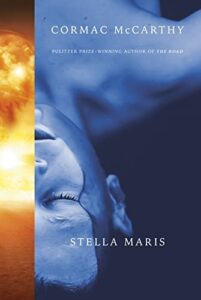
Our feast of fabulous reviews this week includes Philippa Snow on Allie Rowbottom’s Aesthetica, Dwight Garner on Cormac McCarthy’s Stella Maris, Peter C. Baker on Rob Delaney’s A Heart That Works, and Lily Meyer on Lydia Millet’s Dinosaurs.
“Not technically a horror novel in the strictest sense, although it contains numerous scenes of degradation and assault and, as such, it is a uniquely horrifying novel, a bracingly mordant document of a very specific brand of online fame … One of Aesthetica’s best, most genuinely thrilling qualities is its depiction of the intellectual and ethical whiplash that results from the collision of competing schools of feminism and ever-evolving bodily trends … Anna’s attitude to the objectification and the modification of her body is complex and conflicted, making her an admirably realistic image of a gorgeous Gen-Z feminist living through the tail-end of the 2010s … Rowbottom leaves ample room for ambivalence, and while Aesthetica is pitch-black and occasionally distressing, it is never didactic … To paint Aesthetica as uniformly furious or vicious would be, in spite of these numerous references to violence, incorrect. Certainly, it has its incandescent moments, but a righteous, sharp-edged satire about plastic surgery and Instagram would, I think, be one of the easiest kinds of novel to produce about the subject, and the tone here is a different thing entirely. If pressed, I would say that it was elegiac … Rowbottom’s prose, in lieu of the cool and clinical style one might expect from writing on a subject that is internet-adjacent, is at times poetic, and quite often sweetly melancholic.”
–Philippa Snow on Allie Rowbottom’s Aesthetica (Astra)

“Artists tend to simplify their form with age, and the big novel has traditionally been, to paraphrase writers dead and living, no country for very old men. But this fall, Cormac McCarthy, who is pushing 90, has arrived with a pair of audacious linked novels, one a total banger and the other no embarrassment. If this is what it sounds like to be on your last legs, young writers should ask their server for whatever he’s having. If McCarthy’s voice is any indication, he’s still limber enough to outrun an aggrieved cheetah in his drawers and stocking feet … Novels aren’t made, generally, to be filled entirely by talk. But that’s what Stella Maris is—transcriptions of therapy sessions with one of the hospital’s shrinks. This is a Tom Stoppardesque bull session. Does it work? Uh-huh. Does it work more fully if you’ve already read The Passenger? Absolutely … It’s best read while you are still buzzing from the previous book. Its themes are dark ones, and yet it brings you home, like the piano coda at the end of Layla … No one in the real world talks the way Alicia does—she’s seeing with her third eye, flexing her middle finger at the world, rocking her family’s thundersome legacy—but they might if they could. She lays down the cataclysmic one-liners…McCarthy is an inveterate ham, so all this is cut with humor … Reading Stella Maris after The Passenger is like trying to hang onto a dream you’ve been having. It’s an uncanny, unsettling dream, tuned into the static of the universe.”
–Dwight Garner on Cormac McCarthy’s Stella Maris (The New York Times)
“From the start, everything is narrated from a present tense in which Henry is already gone; just as in life, where grief explodes and warps time, everything feels incredibly close one second and unbearably far away the next … The book can feel like a dagger that stabs you again and again … But we also get some laughs along the way. Alongside the recounting of panicked hospital visits, scary infections, and breathing-tube struggles, there are comic riffs and asides that wouldn’t be out of place in a Delaney standup set, or on his Twitter feed. These two strands—the grief and the laughs—don’t just sit side by side; they work together. When Delaney gets going about the confusing nature of hospital layouts, or his troubles having his American voice understood by a phone menu designed to respond to Brits, it does a few things at once. It’s a momentary reprieve, however partial, from the book’s unalterable trajectory. It’s a formal embodiment of Delaney’s advice, to other parents of severely ill children, about finding opportunities for immediate delight, resisting the power of disease’s shadow to darken everything. It’s funny. Then Delaney yanks you back to grief. You wonder, guiltily, if you latched on to the reprieve a bit too eagerly … Early on, Delaney says that he knows evoking his experience accurately will hurt people. Therefore, he writes, he wants to hurt people … The pain comes less from horrifying details than from the way Delaney lures us into contact with the very aspects of our lives that are easiest to ignore: our fragilities, our constant proximity to calamity, our powerlessness to control what life brings, or when … All along, the jokes keep coming, letting you laugh, sometimes just to laugh, and sometimes so you can hurt more, the laughter and the hurt getting increasingly tangled, long past the point where it would be possible to prise them apart.”
–Peter C. Baker on Rob Delaney’s A Heart That Works (The New Yorker)
“In 1998, Russell Banks published an incendiary epic called Cloudsplitter about John Brown and his abolition cause. A finalist for a Pulitzer Prize, the novel felt like thunder in print. It remains the pinnacle—but certainly not the end—of Banks’s remarkable efforts to capture the moral complications of a radical life. His new novel, The Magic Kingdom, returns again to that theme but in an entirely different register. The violent fury of the abolitionists’ principles has been replaced by the quiet intensity of the Shakers’ faith. Both groups looked aghast at a world intolerably corrupted, and both pursued strategies to utterly transform the status quo. But the Shakers, following the inspiration of Mother Ann Lee, withdrew into their egalitarian, celibate communities. And by setting his story among these outwardly peaceful, inwardly passionate believers, Banks has created another fascinating volume in his exploration of the American experience … Stories of utopia are necessarily infused with sorrow. The term, after all, means ‘no place,’ but its derivation has never muted the attraction of such an impossibility. Lauren Groff captured that tension exquisitely in her 2012 novel, Arcadia, set in the 1960s, and now Banks draws us back to the febrile atmosphere of 19th-century America when philosophical and spiritual enthusiasms germinated in communities across the land … Our literature is thick with skepticism, condescension and downright derision directed at anyone who takes their faith more seriously than an Instagram poem. But Banks has something more complex in mind than the hypocrisy of a religious leader or the predictable impurities of a pious community. He’s interested in the way grand schemes intended to perfect human nature produce instead a combination of secrecy and shame that can spark wildly unpredictable results.”
–Ron Charles on Russell Banks’ The Magic Kingdom (The Washington Post)
“…anybody who’s read Millet—who released her first book, Omnivores, in 1996, and has been publishing steadily since—understands that she thrives artistically on risk. My guess is that she requires it. In her 2014 novel, Mermaids in Paradise, she inserts mermaids into an otherwise realist story; in Sweet Lamb of Heaven (2016), she descends into full, devilish horror; and in her collection Fight No More (2018), she briefly but searingly inhabits the mind of a rapist as he prepares to assault his stepdaughter. It’s a horrific scene, but neither insensitive nor gratuitous. In fact, the story not only earns but needs it. Compared to that risk, or to the infinitely milder one of putting merpeople in a non-fantasy novel for adults (a move Melissa Broder later echoed in The Pisces), writing a fresh novel with a main character who’s a bit of a literary dinosaur should be nothing. Child’s play … Yet Dinosaurs is more than a simple story of a late bloomer finding out just how much he’s been missing. Millet uses Gil’s growth to explore deep questions of human responsibility—to our communities, our natural environments, and the softer, needier parts of ourselves … Millet matches the delicacy with which she handles her characters’ inner lives with a noticeably light style. She writes swift, spiky prose that balances descriptive beauty with irresistible momentum—sometimes brutally so … she offsets the diffuse sorrow that hovers in Dinosaurs with a finely tuned sense of the absurd. For all the book’s restraint, she lets it be what my grandfather would call a ‘shaggy-dog story’: not just a yarn, but a bit of a joke.”
–Lily Meyer on Lydia Millet’s Dinosaurs (Bookforum)

